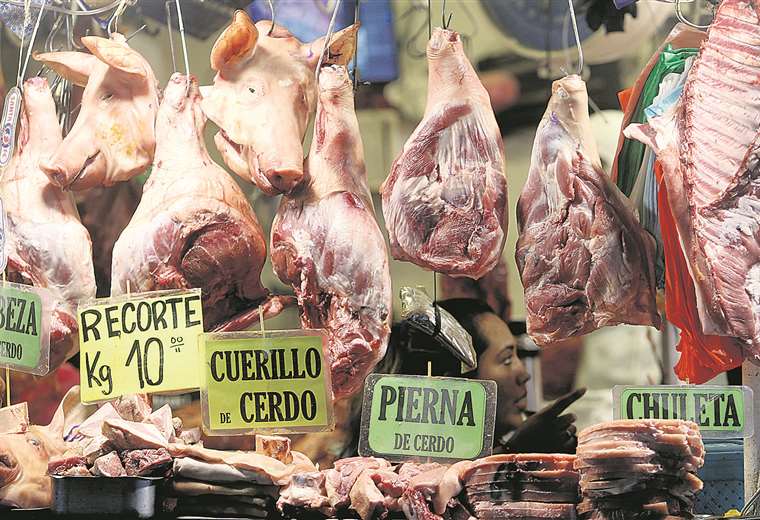The increase in prices of at least seven essential foods for Bolivians moves the slate of retail costs and forces consumers to do numbers before buying. To the increase in cost per kilo of beef, pork, potatoes, onions, carrots, beets and cheese must be added.
In a tour of the different supply centers (San Antonio market, Km 6 La Guardia, Mutualista, Los Pozos, and Abasto Antiguo) of Santa Cruz, it was possible to record that the warning of the retail meat marketers, affiliated with the Confederation National Workers in Meat of Bolivia (Contracabol), to increase the price of the kilo of beef was fulfilled. Thus, the cut of first class went from 34 to fluctuate between Bs 35 to 38, while the second class -which was between Bs 29 and 30- rose to Bs 32 and 33.
In this regard, Jesús Huchani, president of Contracabol, explained that this increase, of up to Bs 4, will gradually take place in all the country’s markets, unless the Government eliminates the intermediaries and manages to lower the hook kilo to Bs 20.5, when it currently ranges between Bs 21 and 22.
Another food with an upward trend is pork. According to data from the Agricultural Chamber of the East (CAO), as of September 5. the kilo of food for the final consumer was at Bs 17. However, traders from the markets consulted indicated that in recent days the kilo of hook rose from Bs 13 to 19.
A situation that caused the modification of the costs. The kilo of the leg went from Bs 16 to Bs 22, the kilo of ribs rose from Bs 23 to Bs 27, while the chop went from Bs 22 to Bs 25.
Jorge Méndez, president of the Departmental Association of Pig Farmers of Santa Cruz (Adepor), indicated that the rise in prices is a reality that cannot be denied, but that this is due to a direct effect of the increase in the cost of the inputs used by the sector.
Méndez explained that already in July of this year the Government and the oil companies agreed to raise the cost of soybeans to Bs 3,000 per ton, about Bs 500 more. He also noted that the price of a quintal of corn rose from Bs 45 to 105, to which must be added the 52% increase in imported inputs such as vitamins.
“Given this context, we have no other option but to transfer these increases in production costs. If we don’t do it, we will disappear as a sector”, justified Méndez.
other foods
For a few days the three pounds of floury potatoes have been at Bs 11, when at the beginning of the month, according to data from the CAO, they were worth Bs 8. The three pounds of onions increased from Bs 7 to Bs 10, while the three pounds of carrots are sold between Bs 6 and 7; before they were at Bs 5, like the three pounds of beets, which now do not fall below Bs 7. The kilo of cheese increased from Bs 24 to Bs 28 and 29.
On the subject, Óscar Mario Justiniano, president of the CAO, maintained that this is a complicated issue since this does not happen from the primary chain, in time to specify that there is no increase in producers or in refrigerators and that the rise is liability of intermediaries.
“The price of the live animal is stable, the volume of deliveries is constant, there is no shortage and there are, for the moment, no external factors that could generate an increase such as blockades or floods,” said Justiniano.
Regarding the price of pork, the representative of Santa Cruz remarked that the cost of food moves by supply, demand and stock of animals and that historically the price of pork rises at the end of the year due to the increase in demand.
As for how to deal with this upward trend, Justiniano said that many of the marketing chains of raw materials of agricultural origin are managed through intermediation, this affects the normal development of deliveries and leads to speculation. In this chain, the one who manages a stable low price is the producer, the one who gets the most revenue is the intermediary, and the one who is affected is the housewife. As long as this matrix is the basis of consumer markets, it is quite difficult to make predictions or projections, the businessman concluded.
Omar Rivera, president of the Departmental Federation of Neighborhood Boards, lamented that the price of beef has increased and said that he will hold a meeting to determine the pressure measures that range from a march to a hunger strike.
















